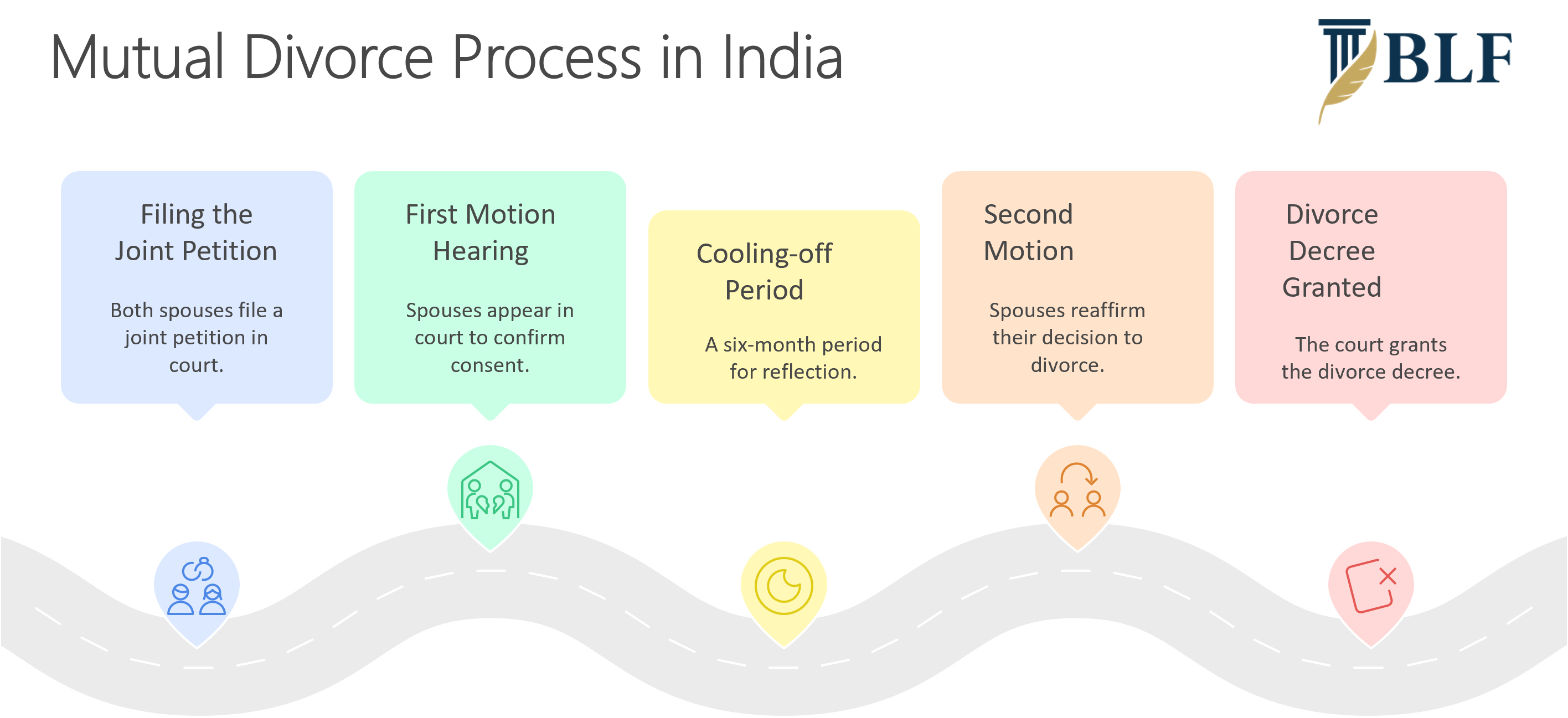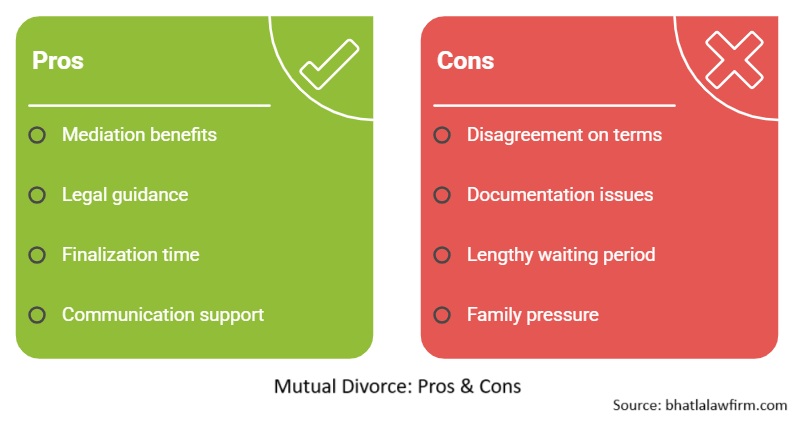Mutual Divorce Process in India: Step-by-step Guide
When couples realize their marriage has reached its end despite their best efforts, the mutual divorce process in India offers the most compassionate path forward. This comprehensive guide breaks down every step you need to know about obtaining a divorce by mutual consent.
Mutual consent divorce allows couples to honor what they once built together while acknowledging it can no longer continue. Both spouses agree to dissolve their union with dignity while thoughtfully settling all related matters like property division, child custody, and financial support.
What is Mutual Divorce in India?
Mutual divorce, legally known as divorce by mutual consent, occurs when both husband and wife courageously acknowledge their marriage cannot be saved. The couple must have been living separately for at least one year before filing the divorce petition.
This type of divorce is governed by Section 13-B of the Hindu Marriage Act, 1955. Other personal laws like the Indian Christian Marriage Act and Parsi Marriage and Divorce Act have similar provisions.
The process respects both parties’ need for closure without the pain of assigning fault. Mutual divorce recognizes that sometimes love changes form, and the kindest act is letting go.
Legal Requirements for Mutual Divorce
Before filing for mutual divorce in India, couples must meet specific legal criteria:
Separation Period: The couple needs to be separated for at least one year and provide evidence that they have not been living as husband and wife during this period.
Mutual Agreement: Both parties must agree on all terms including alimony, child custody, property distribution, and other matrimonial matters. No disputes should remain unresolved between the spouses.
Joint Petition: The application must be filed jointly by both husband and wife. Neither party can file unilaterally for mutual consent divorce.
Mutual Divorce Process in India (Step-by-step)

Step 1: Filing the Joint Petition
The process begins when both spouses file a joint petition in the family court. This petition is filed under Section 13-B before the family court of the relevant jurisdiction.
The petition should state that both parties have lived separately for the prescribed period. It must also mention their mutual decision to dissolve the marriage and settlement of all related issues along with mutual settlement deed.
Step 2: First Motion Hearing
The court schedules the first hearing after receiving the petition. Both spouses must appear together before the judge to confirm their consent.
The judge examines whether all legal requirements are met. The court may ask questions to ensure the decision is voluntary and not coerced.
Step 3: Cooling-off Period
The court grants a six months cooling period, recognizing that ending a marriage deserves time for reflection. This mandatory waiting period allows couples to sit with their decision and explore any remaining possibilities.
Recent legal developments allow courts to reduce the waiting period but it is solely at the discretion of the judge
Step 4: Second Motion
After the cooling-off period expires, couples must file the second motion. Both parties need to reaffirm their decision to divorce during this hearing.
The court confirms that reconciliation attempts have failed. If both parties maintain their position, the divorce decree is granted.
Required Documents
Gathering proper documentation is essential for smooth processing:
Address Proof: Current residence proof which includes Aadhaar cards, voter ID, passport, or driving license for both spouses. Utility bills or rental agreements serve as address proof.
Marriage Certificate: Original marriage certificate issued by the registrar or religious authority. Wedding invitation cards can serve as supporting evidence.
- Marriage Photograph
- Passport Size Photograph
- Childern Birth Certificate if any
Time Frame and Costs
Generally, it takes around 6-8 months to complete the entire process. The timeline depends on court schedules, documentation completeness, and cooling-off period waiver decisions.
Court fees vary by state but typically range from ₹100 to 200. Legal fees depend on lawyer experience and case complexity, usually between ₹25,000 to ₹1,00,000.
Additional costs include documentation, affidavit attestation, etc. The total cost remains significantly lower than contested divorce proceedings.
Benefits of Choosing Mutual Divorce
Mutual divorce offers several advantages over contested proceedings:
Faster Resolution: The process completes much quicker than contested cases. Courts prioritize mutual consent cases due to their straightforward nature.
Cost-Effective: Legal fees and court costs remain minimal. The absence of lengthy litigation saves substantial money for both parties.
Privacy Protection: Mutual divorce proceedings are less public than contested cases. Personal details and family matters stay confidential.
Reduced Emotional Toll: The gentle approach minimizes trauma when a relationship must end. Both spouses can grieve their marriage while maintaining respect for their shared history.
Preserved Dignity: Both parties can walk away with their heads held high. The absence of public conflict allows healing to begin without additional wounds.

Common Challenges and Solutions
Despite its benefits, couples may face certain obstacles:
Disagreement on Terms: Sometimes spouses cannot agree on property division or child custody. Mediation sessions can help resolve such disputes amicably.
Documentation Issues: Incomplete or incorrect documents can delay proceedings. Proper legal guidance ensures all paperwork is accurate and complete.
Cooling-off Period: The mandatory waiting period may seem unnecessarily long. However, this time often helps finalize settlement terms properly.
Family Pressure: Extended family members may pressure couples to reconsider. Clear communication about the mutual decision helps manage such situations.
Child Custody in Mutual Divorce
When children are involved, their wellbeing becomes everyone’s primary concern. Parents must agree on arrangements that put their children’s needs first, even when their own hearts are breaking.
For the well being of children both parents enter the detailed terms and conditions on the settlement deed which they make as a part of documentation process. It includes monthly expenses , visitation rights etc depending on case to case.
Property Division Guidelines
Fair distribution of matrimonial assets requires careful consideration:
Separate vs. Joint Property: Assets acquired before marriage usually remain with the original owner. Joint assets purchased during marriage are divided equally or as agreed.
Valuation Process: Professional valuation may be required for properties, businesses, or investments. Both parties should agree on the valuation method and assessor.
Debt Responsibility: Joint liabilities like home loans are typically shared. The spouse retaining the property usually assumes the corresponding debt.
Alimony and Maintenance
Spousal support depends on various factors including earning capacity, age, health, and lifestyle. The spouse with lower income may receive maintenance from the higher-earning partner.
Lump-sum payments are preferred in mutual divorce cases over monthly maintenance. This arrangement provides closure and prevents future disputes.
The amount is decided through negotiation between the parties. Courts rarely modify mutually agreed maintenance amounts unless circumstances change drastically.
Bhatla Law Firm’s Expert Divorce Services
Navigating the mutual divorce process requires experienced legal guidance. Our team of family law experts has successfully handled hundreds of mutual consent divorce cases across India.
We provide comprehensive services including petition drafting, documentation assistance, court representation, and settlement negotiations. Our client-focused approach ensures personalized attention to every case detail.
Our expertise spans all personal laws including Hindu, Muslim, Christian, and Parsi marriage acts. We understand the nuances of different religious and cultural contexts in divorce proceedings.
Schedule your free initial consultation today to discuss your mutual divorce requirements. Our experienced attorneys will guide you through every step of the process while protecting your interests.
Conclusion
The mutual divorce process in India offers couples a way to honor their shared history while acknowledging their separate futures. With proper legal guidance and genuine mutual respect, the process becomes a bridge between what was and what needs to be.
Understanding the legal requirements helps, but understanding your own heart matters more. When both are aligned, the legal process becomes a tool for healing rather than a weapon for harm.
At Bhatla Law Firm, we recognize that behind every divorce petition are two people trying to do right by themselves and each other. Our experienced team provides not just legal expertise, but compassionate guidance through one of life’s most difficult transitions.
Contact us today for a free consultation and take the first step toward a new beginning. Our compassionate and professional approach ensures your mutual divorce process is handled with the utmost care and expertise.

